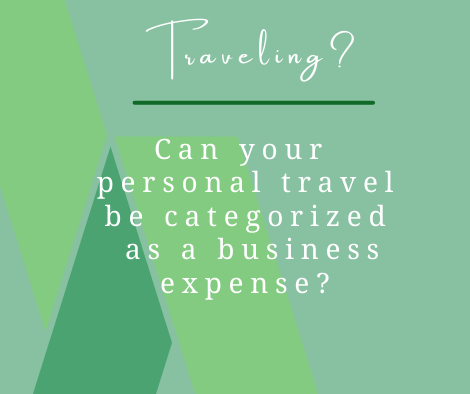Travel days: Business or personal?
First Let Look at How the Law Decides If Your Travel Day Is Personal or Business
If you operate a business and you travel to a business location where you spend the night, you are in travel status. But will the tax rules make this a business or a personal night?
The rules also affect your costs during the day. When you have an overnight business travel day, you generally deduct your costs of sustaining life for the day, such as breakfast, lunch, dinner, snacks, drinks, lodging, and taxis.
Business days also are important in determining how much of your travel cost you may deduct. For example, on a seven-day trip to London, one business day makes the airfare deductible. (Hello!)
Yep, Six personal days and one business day in London—you deduct 100 percent of the airfare. (CHEERIO anyone?)
The umbrella of it all
The IRS won’t fight with you about classifying a day as a business day if you can prove that the whole day was devoted to business. Here is what you need to know about the days not entirely spent on business.
Transportation Day
Transportation days are the trickiest.
Days traveling to or returning from a destination outside the United States are treated as business days—provided you use a “reasonably direct route” and you don’t engage in “substantial diversions for non-business reasons” that prolong your travel time.
In other words, no stopping on the way back from Zurich for a quick shopping trip in New York! (Lol)
 Mode of Transportation
Mode of Transportation
These rules apply to whatever mode of transportation you use. So if you travel by airplane and don’t take a reasonably direct route, you count as business travel days the number of days an airplane would take to reach your destination by a reasonably direct route. The same is true for travel by car or cruise ship.
Simple Travel Math: Flying to Zurich? Flight from Miami to New York, to Paris, to Zurich = 19.5 Hours (Would be almost three business days) Since this is not the most direct route it is only considered one day because a ‘reasonable direct route’
Miami to Zurich non stop = 9.5 hours non stop
Two examples from IRS regulations:
Example 1. A taxpayer residing in New York departs on an evening direct flight to Quebec for a business meeting to be held in Quebec the next morning. For purposes of counting the number of travel days, the day of departure is considered a business day.
Example 2. A taxpayer travels by automobile from New York City to Quebec City to attend a business meeting and, while en route, spends two days in Ottawa and one day in Montreal on non-business activities. Here, the taxpayer can count as business days the number of days outside the United States that it would take to drive by a reasonably direct route to Quebec, “taking into account normal periods for rest and meals.”
According to Google, you would spend about eight and a half hours driving from New York City to Quebec City. With the border crossing, meals, and gas stops, that easily converts to two business days of travel. Thus, if you spend five days getting from New York City to Quebec City, two of the five days count as business days.
Days When Your Presence Is Required
If your presence is required at a particular place for a specific and bona fide business purpose, that day is a business day regardless of time spent on business.
Something of note: You live in San Francisco but need to travel to Washington, D.C., personally to sign a contract. The contract signing takes 30 minutes. The contract signing day is a business day. The two travel days (to and from D.C.) also are business days.
Days That Are Primarily Business
You have a business day on a day when, during the hours normally considered appropriate for business, your principal activity is the pursuit of business.
Under this rule, if eight hours is the appropriate length of a workday, you have to work at least four hours and one minute to qualify the day as a business day.
 Circumstances Beyond Your Control
Circumstances Beyond Your Control
If you travel to a business location with the intent to conduct business but could not conduct that business because of circumstances beyond your control, you have a business day.
Something of Note: You travel to Disney World to attend a seminar. The seminar leader is struck ill, and no seminar is held. You go to Epcot for the day. The day is a business day.
(Your Epcot ticket is not deductible. But the rest of your expenses for food and lodging qualify as business deductions because your return flight is the next day.)
Weekends, Holidays, Standby Days
If a Saturday, a Sunday, a legal holiday, or another reasonably necessary standby day intervenes while you endeavor to conduct your business with reasonable dispatch, you treat such a day as a business day. (Woo Hoo!)
On the other hand, if the meetings concluded on Friday and you spent the weekend on the beach, you would count those days as personal, non-deductible days. (sorry!)





